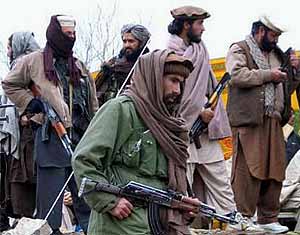03.03.2009
March 02, 2009 (the date of publication in Russian)
Maxim Kalashnikov
FROM PAKISTAN TO AFPAK?
The Afghan "black hole" is going to greatly expand
 REGIONS OF ANARCHY
REGIONS OF ANARCHY
Intending to activate warfare in Afghanistan, Washington is pushing its longtime true ally, Pakistan, to the brink of collapse. The US military presence in this country has already provoked a full-scale civil and tribal war, while an abrupt economic decline is plunging Pakistan into the abyss of anarchic disintegration. Instead of a consolidated Afghani statehood, the United States is likely to deal with a seething boiler of Afpak (Afghanistan plus Pakistan).
In fact, the Tribal Territory of Pakistan, in accord with the Taliban-dominated regions of Afghanistan, is already in a state of war with the American, as well as European occupying troops. The Khyber Pass is blocked, and the US military cannot use it for supplying their bases in Afghanistan. Islamabad has lost control of the rebellious tribes that had in fact never recognized the once artificially established border, the so-called Durand Line. Pentagon's analysts admit that the Talibs and Al Qaeda are operating in the area with almost no hindrance.
In particular, the southern part of Waziristan is actually under the rule of Baitullah Mehsud, a Talib warlord who was suspected of financing the assassins of ex-Prime Minister Benazir Bhutto. Baitullah is reportedly committed to establish an independent Emirate of Waziristan.
Pakistan's central government is losing control over Punjab as well. In Peshawar, the center of the north-western province, officially persecuted warlords almost openly acquire real estates. Overtaking the Swat valley, the Talibs imposed the Shariat law and spawned a lot of religious schools where lots of youths from impoverished families get food and shelter, and thus being recruited into a fanatic paramilitary network. In a similar way, radical Islamic communities spread in Baluchistan.
The federal army that had long been preparing for mounted warfare against India, enforced with nuclear weapons, is now involved in local operations across the Tribal Territory. The $10 billion loan, received by Ali Zardari's government from the United States, has dissolved without visible results. Air assaults upon the Talib strongholds in the border area only intensify the sentiment of resistance across Pakistan and contribute to the government's unpopularity. In this way, Pakistan is becoming a patched-up territory ready to fall apart.
THE ECONOMIC DISASTER
At the same time, Pakistan is overwhelmed by a severe economic crisis. The country's productive economy had been dominated with textile industry that provided one half of jobs and one half of export revenues. Today, textile production is stalled due to lack of natural gas and electricity. In February 2009, almost one third of Punjab textile factories were close to bankruptcy.
Unlike India and China, Pakistan has not managed to diversify its economy. Therefore, the flow of Chinese goods is undermining local production. Overpopulation of cities, unemployment, misery and lack of fertile lands and water resources are driving the Pakistani into despair. The incumbent democratic government is hated by 88% of the citizens. However, the military regime, in case it is re-established today, will hardly manage to solve the economic, social, and ethnic problems.
In the process of disintegration, the military nuclear arsenal may fall in the hands of radicals. This option is obviously the direst. However, the US occupation of Afghanistan has in fact increased this possibility.
During seven years of occupation, the United States has not managed to establish a capable government in Afghanistan. Most of the gigantic financial support, disbursed for maintenances of the occupying contingent and the national army of 80,000 soldiers, has been embezzled, while the key problem of drug trafficking remained unresolved.
The mechanical expansion of the national army to 134,000 soldiers, with reference to Iraq where Washington in fact maintains manpower of 237,000, is not going to be helpful. New donations are likely to be embezzled as well, while new-delivered ammunition and fuel is likely to fall into the hands of the warlords. Disbursing annually $40 billion for the Afghan war – ten times more than the USSR in 1908s, the United States is falling in the same trap the Soviet Army had already fallen.
THE IMPLICIT COMMITMENT
The United States could have prevented the present anarchy and social disaster in Pakistan. Instead of undermining the government of General Pervez Musharraf, Washington could provide comprehensive assistance to the strategic ally, recruiting high qualified specialists, organizing reconstruction of local industry, roads and community infrastructure, deliver agricultural machinery, building desalinating plants and water ducts, creating jobs and thus generating a healthy alternative to shadowy economy of opium growing. Instead, Bush's government relied upon the miracle of democratization, mechanically imposing standards of Western lifestyle upon a people with a conservative religious tradition. Not surprisingly, this effort was perceived in Central Asia as an assault on the cultural identity, while the occupying contingent is seen as a legion of infidels. Trying to transform the culture instead of assisting in economic and social life, the US has reached a result opposite to the original intention.
Facing unprecedented pressure of domestic financial problems, the United States is unlikely to afford a really durable economic transformation of Pakistan, as well as consolidation of the Pakistani statehood. Realizing this fact, the administration of Barack Obama is still planning to invest more in the inefficient military occupation in the region. This commitment may be interpreted with only one kind of geopolitical logic: instead of assisting the nations of Central Asia, Washington intends to ignite full-scale warfare in the whole region of Afpak that would undermine neighboring regional powers, particularly India, Iran, and Russia.
Number of shows: 2388
 ENG
ENG 

 ENG
ENG 
